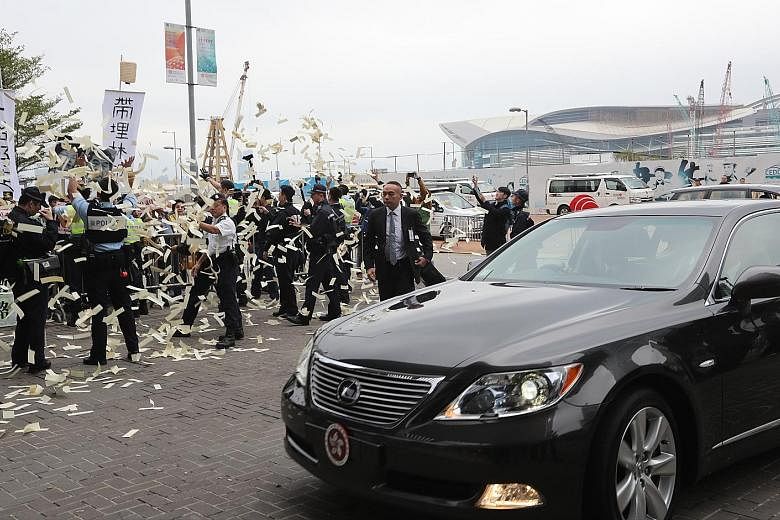With less than six months left before he steps down as Hong Kong's Chief Executive, Mr Leung Chun Ying used his final policy address yesterday to secure his legacy.
In a move certain to bring cheer to employees, Mr Leung said the government would progressively abolish a practice that allows employers to use their contributions to their workers' retirement funds to offset severance or long-service payments.
The move is strongly opposed by the city's business sectors, which argue that it will impose a heavy financial burden on businesses.
The 62-year-old leader, who aims to fulfil a promise he made in his election manifesto five years ago, said the government will bear part of employers' cost in the next 10 years when the abolition is implemented progressively.
The move could see the government foregoing tax revenue of HK$18 billion (S$3.3 billion).
"In the face of the challenges posed by an ageing population, these substantial public finance commitments not only demonstrate the determination and sincerity of the government, but also take into account the affordability of the government and employers, as well as maintain a balance between the interests of employers and employees," he said.
-
Other highlights of policy address
-
• Government to inject HK$20 billion (S$3.7 billion) over the next five years to launch 26 projects to develop new sports and recreation facilities or improve existing ones.
• Free quality kindergarten education policy from the next school year, which will see up to 80 per cent of subsidised half-day kindergarten places being free of charge.
• New initiatives for One Belt, One Road such as taking part in the Belt And Road Forum For International Co-operation in Beijing, and to consider relaxing visa requirements for nationals of the One Belt, One Road countries to come to Hong Kong to work or study, and supporting professional sectors in their exchanges, cooperation and related publicity efforts targeting overseas markets under the HK$200 million Professional Services Advancement Support Scheme.
Joyce Lim
Mr Leung, who shocked many last month with his decision not to seek a second term, oversaw the most turbulent time in modern Hong Kong.
Touching on a wide range of issues including healthcare, education, and property and land policies in his 21/2-hour speech, Mr Leung said all commitments in his election manifesto "have basically been implemented".
On the city's perennial housing shortage, he said that even though supply has increased during his term, the issue will remain "a tough nut to crack" if the government and the community do not speed up identifying land for housing.
He added that housing challenges "boil down to land use, which is not a technical issue, but a conceptual one".
He urged the public to "think out of the box" and re-examine land use planning for the benefit of the next generation.
Responding to this, Civic Party lawmaker Kwok Ka Ki accused Mr Leung of lying "when he said he has delivered on almost all his promises", citing how property prices have shot up by almost 50 per cent since Mr Leung took office in 2012, despite his pledge to make housing more affordable.
Local sports got a boost, with Mr Leung announcing that HK$20 billion would be spent to revamp the city's sports facilities.
Mr Leung, who was heckled by some pro-democracy lawmakers, also left his last words as the city's leader to independence advocates.
Hong Kong, he said, has benefited from developments in mainland China and national policies in its favour. And Hong Kong as an inalienable part of China is both "a legal fact and an internationally recognised political reality, leaving no room whatsoever for Hong Kong to become independent or separate from the motherland".


